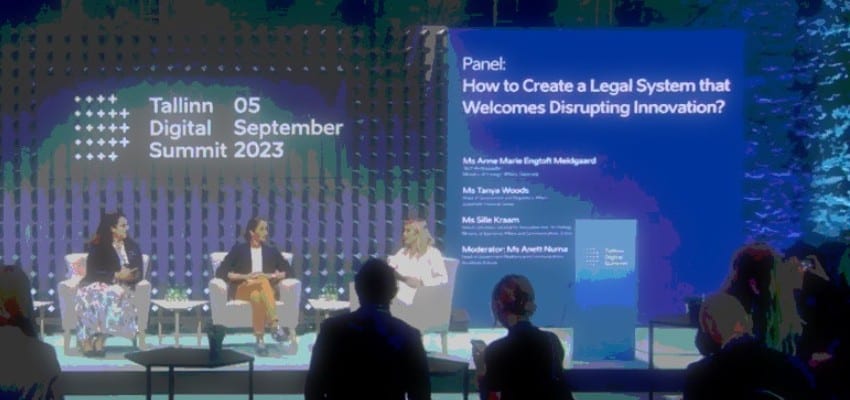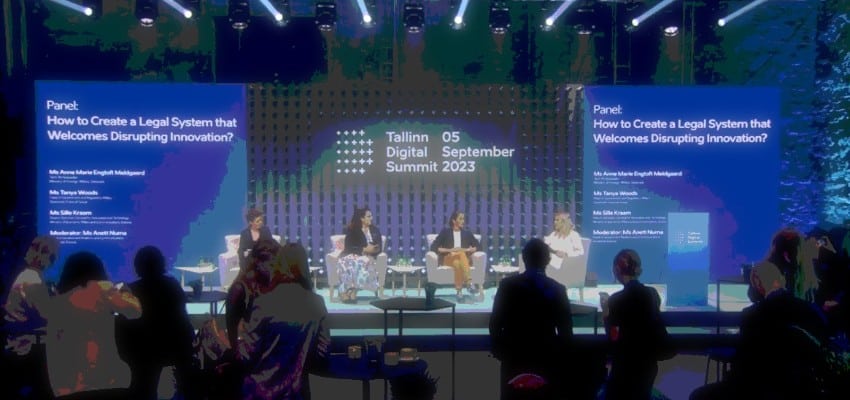|
|
Content Assessment: Regulatory Governance and Technological Advancements: Insights from Tallinn Digital Summit 2023
Information
Insight
Relevance
Objectivity
Authority
Excellent
A short assessment of the qualitative benefit of the Tallinn Digital Summit panel on "How to Create a Legal System that Welcomes Disrupting Innovation?" presented on September 5, 2023, in Tallinn, Estonia.
Editor’s Note: The Tallinn Digital Summit, held on September 5, hosted a panel discussion on “How to Create a Legal System That Welcomes Disrupting Innovation.” In the discussion, experts discussed the role of government in fostering innovation and the importance of updating legal systems to accommodate new technologies. Panelists included esteemed experts from Estonia, Denmark, and Canada. During the 30-minute discussion, the experts highlighted the need for governments to be proactive in pushing innovation, the importance of public-private partnerships, and the potential benefits of experimental law. They also emphasized the need for a culture shift within the public sector to support innovation and the importance of trust in fostering collaboration between the public and private sectors.
Summit Panel Summary
How to Create a Legal System That Welcomes Disrupting Innovation?
ComplexDiscovery Staff
On September 5, 2023, the atmosphere in Tallinn, Estonia, was charged with anticipation as professionals from various sectors converged for the Tallinn Digital Summit. One of the highlights of the day was a panel discussion focused on the intricate relationship between technological innovation and regulatory governance, a topic of paramount importance for professionals in cybersecurity, information governance, and eDiscovery. These fields are increasingly influenced by rapid technological advancements, and understanding how innovation intersects with regulation is crucial for managing risks, ensuring compliance, and fostering a culture of continuous improvement. The panel, which lasted for approximately 30 minutes, was moderated by Anett Numa, a representative from Accelerate Estonia, and featured esteemed panelists: Sille Kraam, Deputy Secretary-General for Innovation and Technology at the Ministry of Economic Affairs and Communication of Estonia; Tanya Woods, Head of Government and Regulatory Affairs at the Quest Trade Financial Group of Canada; and Anne Marie Engtoft Meldgaard, Tech Ambassador of Denmark.
Anett Numa set the stage for the discussion, introducing the panelists and framing the conversation’s objectives. Sille Kraam was the first to articulate her views, noting that innovation and risk are intrinsically linked. She shared that governments must establish a risk appetite and focus on procedural efficiencies rather than solely on technological aspects. Kraam’s insights emphasized the role of government in fostering an environment conducive to innovation. She elaborated on Estonia’s Accelerate Estonia program, which has become a model for public-private collaboration in technological advancements.
Building on Kraam’s points, Tanya Woods took the floor and noted that a holistic approach across governmental departments is imperative. She asserted that co-design and consistent engagement between the public and private sectors yield mutual benefits. Woods introduced the concept of “safe harbors,” legal frameworks that offer a conducive environment for corporate innovation. Her perspective offered a glimpse into the complexities of aligning innovation timelines with regulatory frameworks, a challenge that both public and private sectors must navigate.
Anne Marie Engtoft Meldgaard articulated her views, highlighting that tangible results are the ultimate success metric. She shared that in Denmark, the focus is on engendering trust through digitalization. Meldgaard emphasized the significance of public-private partnerships in Denmark’s journey toward digital transformation, adding another layer to the conversation. Her insights underscored the importance of trust as a cornerstone in the relationship between innovation and regulation.
The panelists then explored the topic of experimental law as a potential facilitator for innovation. While Kraam and Woods acknowledged its potential utility, Meldgaard offered a different perspective. She opined that a shift in cultural mindset could be more productive than legislative changes in fostering innovation.
The discussion concluded with a shared understanding that both government and private sectors have roles to play in fostering an environment where innovation can thrive without being stifled by outdated or overly restrictive regulations. The insights provided by these experts from Estonia, Canada, and Denmark offer valuable lessons for policymakers and industry leaders alike as they navigate the ever-evolving landscape of technological innovation and regulation.
- Read more on the Tallinn Digital Summit panel on “How to Create a Legal System That Welcomes Disrupting Innovation?”
- Watch the on-demand version of this panel discussion at “How to Create a Legal System that Welcomes Disrupting Innovation?”
Assisted by GAI and LLM Technologies
Additional Reading
- eDisclosure Systems Buyers Guide – Online Knowledge Base
- A Running List: Top 100+ eDiscovery Providers
Source: ComplexDiscovery


























